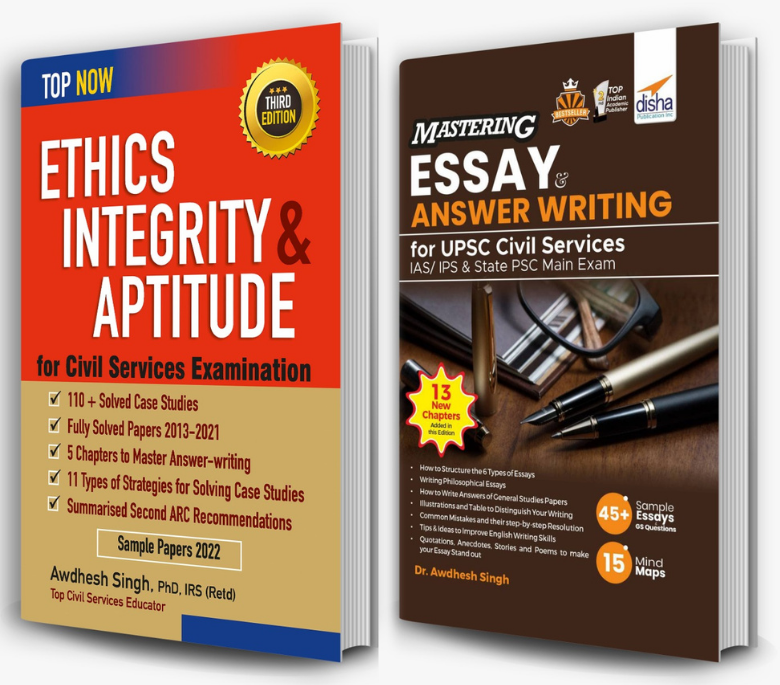Essay and Answer Writing
Topics
All
Civil Services in India (26)
Ethics, Integrity and Aptitude
» Chapters from Book (11)
» Case Studies (8)
Solved Ethics Papers
» CSE - 2013 (18)
» CSE - 2014 (19)
» CSE - 2015 (17)
» CSE - 2016 (18)
» CSE - 2017 (19)
» CSE - 2018 (19)
» CSE - 2019 (19)
» CSE - 2020 (19)
» CSE - 2021 (19)
» CSE -2022 (17)
» CSE-2023 (17)
Essay and Answer Writing
» Quotes (34)
» Moral Stories (18)
» Anecdotes (11)
» Beautiful Poems (10)
» Chapters from Book (5)
» UPSC Essays (40)
» Model Essays (38)
» Research and Studies (4)
Economics (NCERT) Notes
» Class IX (14)
» Class X (16)
» Class XI (55)
» Class XII (53)
Economics Current (51)
International Affairs (20)
Polity and Governance (61)
Misc (77)
Select Topic »

Civil Services in India (26)
Ethics, Integrity and Aptitude (-)
» Chapters from Book (11)
» Case Studies (8)
Solved Ethics Papers (-)
» CSE - 2013 (18)
» CSE - 2014 (19)
» CSE - 2015 (17)
» CSE - 2016 (18)
» CSE - 2017 (19)
» CSE - 2018 (19)
» CSE - 2019 (19)
» CSE - 2020 (19)
» CSE - 2021 (19)
» CSE -2022 (17)
» CSE-2023 (17)
Essay and Answer Writing (-)
» Quotes (34)
» Moral Stories (18)
» Anecdotes (11)
» Beautiful Poems (10)
» Chapters from Book (5)
» UPSC Essays (40)
» Model Essays (38)
» Research and Studies (4)
Economics (NCERT) Notes (-)
» Class IX (14)
» Class X (16)
» Class XI (55)
» Class XII (53)
Economics Current (51)
International Affairs (20)
Polity and Governance (61)
Misc (77)

Mahatma Gandhi
Eating Goat Meat
A Muslim friend of Mohandas Karamchand Gandhi used to persuade him to eat meat. "No," Gandhi would answer him. "Hindus don't eat meat, especially my caste. My ancestors never ate meat." But the friend insisted. "If you don't eat meat, you will remain weak. You have to eat meat if you want to be physically strong."
Gandhi very much wanted to be physically strong. "Are you sure it will make me strong?" he asked. "Yes," replied his Muslim friend.
Since Gandhi was very weak, one evening he tried some goat meat. That night he dreamt that the goat was crying inside his stomach. It was miserable.
Gandhi cried, "I can't eat meat anymore! I have seen the goat crying inside me." And he gave up eating meat forever.
Gandhi goes to killer
In March 1930, Mahatma Gandhi, along with his select band of followers, was on his way to Dandi to break the Salt Law and thereby launch the famous Civil Disobedience Movement in India. A man living near Bharuch, who was opposed to the Gandhian way of ahimsa, threatened to kill him at the first available opportunity.
The news reached the Mahatma. Two to three days passed. In the meantime, the Mahatma ascertained the name and address of that ill-willing person, and one day, in the early hours, he reached his home and announced, ‘Brother! I am Gandhi. You want my life? Take it soon, none will know.’ But the man of ill will was so taken aback, he could not meet Gandhi’s eyes, and went on to became a follower of the Mahatma.
How Gandhi Transformed Boys
Dr. Rabindranah Tagore once admitted "What I could not accomplish in years, Gandhi ji did in a few days," when asked to what Mahatma Gandhi actually did during his stay at Shantiniketan in Bolpur, Bengal.
He said:"I always held that the boys of my school should themselves clean their rooms, make their own beds, cook their meals and wash their dishes. But our boys came from such high caste families that I could not make them do these things. The trouble was that I did not clean my own room, nor make my own bed, nor cook my own meals, nor wash my own dishes. Consequently the boys did not care to take me seriously. I simply lectured; so the boys just listened.
"But when Gandhiji came he at once won the hearts of our boys. He mixed with them as one of them. He told them that it was improper to have servants do the work they themselves should be doing. And he himself cleaned his own room, made his own bed, washed his own dishes and he even washed his own clothes.
"The boys were ashamed of themselves; and they at once began doing all these tasks most joyously. I at once knew how Gandhi won the hearts of the students.
"In the meantime Gandhi asked the scavengers not to do any work for a few days. The high caste boys could never think of doing the work of untouchable scavengers. Life in the school became almost impossible with the odour of night soil.
"Then Gandhi himself carried the pots on his own head to distant fields and buried their contents under- ground. This superman act was contageous. Soon the boys of the highest castes and rich families were vying with one another to have the honour of doing the work of the outcaste scavengers.

Looking for a One-stop Solution to prepare for ‘Ethics, Integrity, and Aptitude’ and ‘Essay and Answer Writing’ for UPSC?
Buy Dr. Awdhesh Singh’s books from the links below-
Buy Dr. Awdhesh Singh’s books from the links below-
Ethics, Integrity & Aptitude for Civil Services Examination
Amazon - https://amzn.to/3s1Qz7v
Flipkart - https://bit.ly/358N2uY
Mastering Essay & Answer Writing for UPSC Civil Services
Amazon - https://amzn.to/3JELE2h
Flipkart - https://bit.ly/3gVIwmv
| Related Articles |
| Recent Articles |
